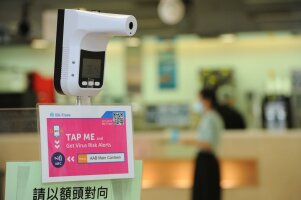
HKBU deploys new AI-enhanced COVID-19 alert system

Researchers at Hong Kong Baptist University (HKBU) have integrated artificial intelligence (AI) technology with BU-Trace, the COVID-19 alert system (the System) they have developed. This eases use of the System and enables health professionals to assess the risk of virus exposure accurately. When applied in taxis, the AI feature can automatically record when passengers leave. The enhanced system also shortens users' check-in time at a venue to just one to two seconds by employing Near Field Communication (NFC) technology.
HKBU enhances system for assessing risk of virus exposure
HKBU has implemented the System on its campus since October 2020 to enhance its COVID-19 risks alert capability. The System was developed by a research team led by Professor Xu Jianliang, Acting Associate Dean of Science (Research) and Professor of the Department of Computer Science at HKBU.
When users scan the System's QR code before entering a venue, the venue information and the time of the visit is saved on their mobile phones. The System sends a message to users through the mobile app BU-Trace if they and an infected person have visited the same place within a time period.
AI technology helps log checkout times
In January 2021 HKBU will deploy the AI-enhanced System that can remind users who visit canteens and restaurants on campus to log their checkout times. When the AI module of the System on a user's mobile phone detects continuous movement (a sign that the user is leaving the canteen or restaurant), a reminder is sent to the user automatically. The user can then log the checkout time simply by tapping a button on the mobile app. To ensure that users do log their checkout time, the System also sends out reminders at regular intervals.
A potential application for this AI-based System is in public transport such as taxis. It can automatically record passengers' leaving time by detecting their movement pattern, without the need for them to tap any button.
NFC technology shortens check-in time
Another new feature of the System is that users can turn on their mobile phones' NFC mode to read the displayed NFC tag when entering a venue, offering an alternative to scanning the QR code. Similar to QR codes, NFC tags contain venue information. However, reading NFC tags with a mobile phone takes only one to two seconds, while scanning QR codes requires five to ten seconds. The use of NFC tags can therefore substantially reduce the time for venue check-in. NFC tag posters will be displayed at HKBU's canteens and restaurants starting from January 2021.
"The system will not collect users' personal information or location data. Neither will the new features access any restricted data in users' mobile phones that requires their permission. This eliminates individuals' privacy concerns while also alerting them to risks of disease transmission associated with confirmed infection cases," said Professor Guo Yike, Vice-President (Research and Development) of HKBU.
"Users will find the novel features more user-friendly. We encourage members and visitors of the University to use the upgraded System, which will be more effective with a high adoption rate. The enhanced System will enable users to keep a more accurate record of the venues they have visited, and provide health professionals with detailed information to assess their exposure risks," he added.
The updated version of BU-Trace 2.0 can now be downloaded from Google Play. It will be available in the App Store soon.
VIDEO
BU-Trace 2.0 AI Auto Checkout & Reminder
Previous News
Next News



